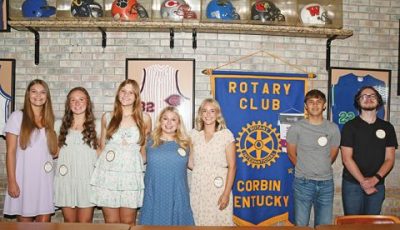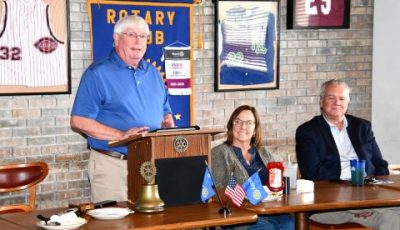Ag commissioner visits Corbin Rotary Club
Kentucky’s Commissioner of Agriculture said last week that the state is well positioned to be even more of an agricultural powerhouse than it is today, provided it continues on a course of diversification and innovation.

Kentucky Agriculture Commissioner Ryan Quarles stopped in Corbin last Thursday to speak to the Corbin Rotary Club as part of his re-election tour across the commonwealth. Quarles touted the importance of agriculture to the state’s economy, the diversity of agricultural products produced and new opportunities with the reintroduction of industrial hemp. State offices will be on the ballot in 2019.
Ryan Quarles, who was on a re-election tour of sorts, stopped to speak to the Corbin Rotary Club last Thursday during the group’s regular weekly meeting at David’s Steakhouse.
The Georgetown Republican noted the connection between the two towns — Scott County High School basketball coach Billy Hicks.
“Coach Hicks was a great ambassador for Corbin. We heard many stories about his time here,” Quarles said.
The rest of his speech to the club was spent touting the importance of agriculture in Kentucky, which accounts for $45 billion of the $206 billion gross domestic product of the state annually.
“There is a lot of agricultural diversity in Kentucky,” Quarles said. “We grow everything from apples to zucchinis, and everything in between.”
He said diversity was essentially forced on the state when tobacco farming began to decline.
There were about 85,000 tobacco growers in the early 1990s. Today there are just 4,000 in Kentucky.
“We’ve come out strong. We wisely invested tobacco settlement money,” Quarles said.
Now, Kentucky is the largest beef cattle producer east of the Mississippi River. And poultry is its No. 1 commodity. Half of all the chicken eaten in the world traces its genetics to the Bluegrass State.
Quarles noted that all of the sausage consumed at Cracker Barrel restaurants comes from Kentucky. And if you’ve ever eaten a McDonalds biscuit in the eastern half of the U.S., it almost certainly came from Kentucky.
Kentucky farms tend to be smaller, but more diverse and productive than the average farm nationwide — typically only about the size of a football field.
Quarles talked at length about the opportunities presented with the reintroduction of industrial hemp into the state’s crop profile.
“It’s not a novelty. It’s a real commodity in our state,” he said. “We sold over $17 million worth of industrial hemp in our state last year. It’s becoming a product people want to buy.”
Quarles said he is relatively confident that its production will be nationally legalized in the upcoming Farm Bill. He noted other alternative crops as well, including hops, which is used in the beer brewing process.
With bourbon markets booming (currently 7 million barrels are being aged) and international markets opening up, Quarles said the future has potential for Kentucky growers, despite uncertainty brought on by recent tariffs.
“We already have the reputation for being the go-to state for high quality agricultural products,” Quarles said. “That’s a big advantage.”








